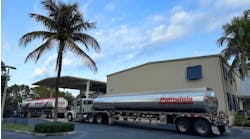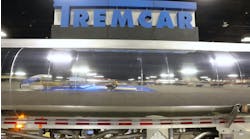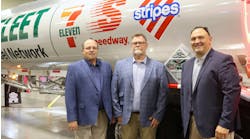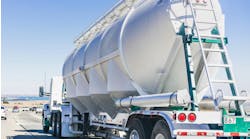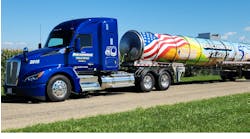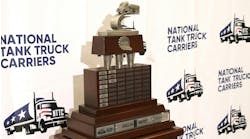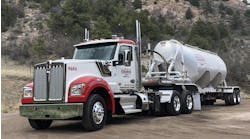As the McCoy Group celebrates its 60th anniversary, its Foodliner Division continues to expand and grow in the foodgrade tank truck industry
SIXTY years ago, a Wisconsin cheesemaker started hauling cream and milk. Today, the operation he launched has grown into the largest foodgrade liquid and dry bulk carrier in the United States.
Foodliner Inc generates annual revenues of roughly $300 million serving customers across North America with a fleet that includes 1,000 tractors and 3,000 trailers. Based in Dubuque, Iowa, it is a division of McCoy Group, which also includes Quest Liner, Truck Country/Stoops Freightliner-Quality Trailer, McCoy Nationalease, and McCoy Construction & Forestry.
“Reaching our 60th anniversary is a huge milestone for us as a family-owned company,” says Greg McCoy, McCoy Group president. “My grandfather (Robert McCoy) would never have expected us to come so far and become so diversified. He would, however, be pleased that this has remained a family business at its core.
“People are the reason Foodliner and the other McCoy Group companies have succeeded. We find people who fit the chemistry of this company. All of them are solid, hard-working loyal individuals.
“Looking to the future, we see plenty of opportunity ahead. We’re confident in the economic outlook, and we will continue to feed the nation as a foodgrade hauler. We also see growing demand for the chemicals and other products that are transported by our Quest Liner chemical transport division. We believe Quest Liner could grow to be a $200 million plus carrier in its own right.”
Greg McCoy credits Rick Rigazio, who was recruited from Chemical Leaman, with putting the food hauler on the path to become a major player in the industry. Rigazio served as Foodliner president from 1992 to 1997.
“He built the foundation for growth that took Foodliner from $19 million to $30 million,” Greg McCoy says.
Humble beginning
The company’s beginning was truly humble. Robert McCoy was a truck driver in the early 1950s when he, a cousin, and another partner decided to start their own trucking company. They chose the name Mc-Mor-Han Trucking Co, which included some of each partner’s name. Robert McCoy directed operations and even drove because his partners had their own full-time jobs.
The company was launched in Darlington, Wisconsin, in 1954 but soon moved to Shullsburg, Wisconsin. Robert McCoy eventually bought out his partners. In 1982, he acquired a small Wisconsin hauler of liquid bulk food products—called Foodliner—with 10 trucks.
Foodgrade tank truck activity grew steadily over the next few years. In 1990, Mc-Mor-Han Trucking was shut down, and the trucking focus shifted to liquid and dry bulk hauling under the Foodliner name.
Foodliner hauls only bulk edibles, including edible oils, sugar, flour, corn starch, water, juices, glycerine, cocoa, chocolate, and yeast. “We’re growing with a diverse base of customers all across the United States,” says Jeff Wesenberg, Foodliner executive vice-president & chief operating officer.
Central dispatch
Operations are coordinated from the central dispatch office at the Dubuque headquarters. Fleet management systems include PeopleNet on-board computers with electronic driver logs and SkyBitz trailer tracking.
“We’ve been running electronic driver logs for 13 years,” says Michael Birkett, Foodliner executive vice-president of safety.
Foodliner’s fleet is dispersed among 22 company terminals as well as a number of third-party locations. Company terminals are in California, Georgia, Illinois, Indiana, Iowa, Kansas, Louisiana, Maryland, Massachusetts, Michigan, Minnesota, Nebraska, New York, Ohio, Pennsylvania, Tennessee, Texas, and Wisconsin.
The first terminal under the Foodliner name opened in the late 1980s in Eddyville, Iowa. It is still a busy place, and services include a maintenance shop and a five-bay foodgrade wash rack for liquid edibles.
While Eddyville has one of the largest wash racks, most of the company terminals have some tank cleaning capability. Five of the terminals have one- or two-bay wash racks that are dedicated to dry bulk cleaning. Foodliner uses commercial cleaning facilities for edible oils.
Demanding economy
Demand for food transport has been strong all year, according to Wesenberg. “Our biggest challenge right now is finding enough drivers,” he says. “The economic confidence level in this country is strong, and people are eating well. We’re seeing strong demand for all of the products we are hauling. Dry bulk and liquid food shipments have grown steadily. We don’t have any slow seasonal months nowadays.”
With the industry-wide driver shortage, Foodliner is scrambling like all the other fleets. “We could use 150 more drivers right now,” Wesenberg says. “We have plenty of work for them. We just have to find people who are the right fit.”
With 40 to 50 additions so far in 2018, the driver team stands at just under 1,000, including about 100 owner-operators. Turnover is in the 40% range.
“We’ve done a number of things to position our company as the fleet of choice for truck drivers,” Wesenberg says. “Our lengthy experience with electronic driver logs taught us that we have to manage our operations differently for maximum driver productivity. As a result, we are gaining drivers from other fleets.
“We’re trying to be a trendsetter with our driver compensation packages. Seventy-percent of our drivers are on a guaranteed pay rate. We also pay a weekend stipend. Drivers get an additional $200 if they work both weekend days.”
Basic requirements for drivers include a minimum age of 22, a commercial driver license, and at least two years of tractor-trailer driving experience or one year of driving plus certification of completion from a truck driving school.
Foodliner recently began hiring some drivers directly out of truck driving school. The carrier has developed relationships with six truck driving schools. At some of the schools, Foodliner is even providing a tank trailer so students get more realistic training.
“We’re hiring more drivers from the schools, and we are seeing a very good retention rate,” Birkett says. “Turnover is just 22%.”
For students selected by Foodliner, the schools provide an additional 80 hours of training specifically tailored to the tank truck carrier, according to Jon Stenzel, Foodliner director of training.
After completing the driving school program, new drivers receive additional training with Foodliner trainers. For drivers who will handle liquid cargoes that means at least one week of on-the-road instruction. Those who will handle dry bulk cargoes get at least two weeks of additional training.
For experienced truck drivers, orientation and training take place at the terminal where they will be based. The orientation is held on Monday, followed by hands-on instruction Tuesday through Friday.
Safety focus
Safety is stressed throughout the initial training. Drivers attend quarterly safety meetings and participate in regular online training. “We’re achieving a 90% engagement factor with the online training,” Birkett says. “We’ve rolled out a smart app with it that was well received.”
Safety is something the Foodliner management team takes very seriously, and fleet tractors are packed with some of the latest safety technology. This includes Wabco collision warning, adaptive cruise control, lane departure warning, and roll stability. The carrier is in the process of analyzing and testing on-board video camera systems.
The next batch of tractors are being spec’d with Holland fifthwheels with the ELI-te safety system that uses LED lights to indicate whether the trailer kingpin is properly coupled to the fifthwheel.
The newest tractors are Freightliner Cascadias with 450-horsepower Detroit DD13 engines and Detroit DT12 automated transmissions. “We believe automatic transmissions are playing a bigger role in driver hiring and retention,” says Kyle Neumann, Foodliner maintenance director.
Sears seats are specified for durability and driver comfort. “We’ve been ordering the Sears seat for nine years now, because drivers prefer it,” Neumann says. “It’s just a better-quality seat.”
New tractors and trailers are fitted with aluminum wheels and widebase Michelin tires. “The tires perform well and they lower vehicle tare weight,” Neumann says.
Product handling equipment on the tractors includes the Gardner Denver MH3 hydraulic power system and Muncie PTO. Tractors in dry bulk service also carry a Gardner Denver blower.
Walker and Polar sanitary stainless-steel tank trailers have a 5,000-gallon capacity. Tank hardware includes BTI valves and Viking product pumps. The newest dry bulk trailers in the fleet were built by Mac Trailer and have a 1,620-cu-ft capacity. All of the dry bulker hardware comes from BTI.
